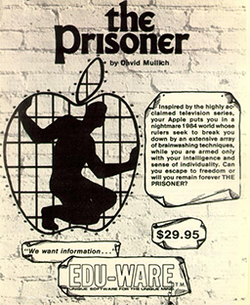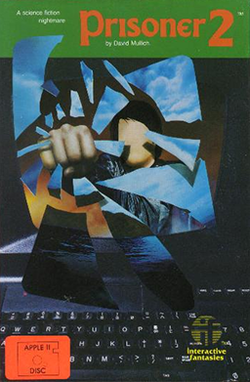The Prisoner (computer game)
| The Prisoner | |
|---|---|

Cover art
|
|
| Developer(s) | David Mullich |
| Publisher(s) | Edu-Ware |
| Designer(s) | David Mullich |
| Platform(s) | Apple II |
| Release |
|
| Genre(s) | Adventure |
| Mode(s) | Single-player |
| Prisoner 2 | |
|---|---|

Cover art
|
|
| Developer(s) | Edu-Ware |
| Publisher(s) | Edu-Ware |
| Designer(s) | David Mullich (designer) |
| Platform(s) | Apple II, Atari 8-bit, IBM PC |
| Release |
|
| Genre(s) | Adventure |
| Mode(s) | Single-player |
The Prisoner is a 1980 Apple II computer game produced by Edu-Ware. The game was loosely based on the 1960s television series The Prisoner and incorporates that show's themes about the loss of individuality in a technological, controlling society. The player's role is that of an intelligence agent who has resigned from his job for reasons known only to himself, and who has been abducted to an isolated island community that seems designed to be his own personal prison. The island's authorities will use any means—including coercion, disorientation, deception, and frustration—to learn why their prisoner has resigned, and every character, location, and apparent escape route seem to be part of a grand scheme to trick the player into revealing a code number representing the prisoner's reason for resigning. The game occasionally breaks the fourth wall by acknowledging that a game is being played.
Considered unique among interactive fiction games of its era, The Prisoner was reportedly used as a training tool by the Central Intelligence Agency.
In 1982, Edu-Ware released a remake, Prisoner 2, with improved graphics and a limited number of design changes.
The game's documentation explained Edu-Ware's view that the Prisoner television series was "a political and social statement concerning the problem of keeping one's individuality and personal freedom in a technological society... [which] is a collective prison and [where] each one of us is, in fact, a prisoner." With the year 1984 looming only four years away from the date of the game's publication, Edu-Ware held that many of the issues raised in the 1969 television series were as relevant as ever, and thus it was "appropriate that a show concerned with the theme of loss of individuality and influence over... [our] own lives should inspire a game to be played on a computer."
The game was reportedly not officially licensed, and despite the fact that it used the same logo as the show, the game's documentation states "it is not meant to be an adaption of the television series". Consequently, a number of changes were made to distance the game from specific elements of the show while preserving its spirit and message:
...
Wikipedia
